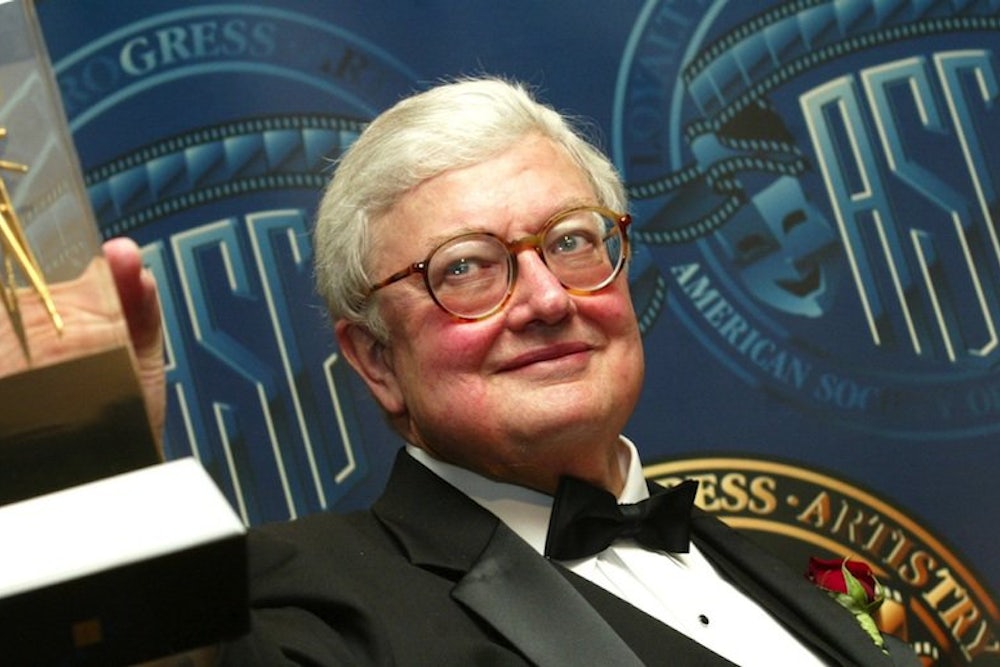“This blog has become a venue for my truths," Roger Ebert wrote in 2011 on his website, a must-read for those of us who loved the voice Ebert found once cancer robbed him of his ability to speak. That illness, which took his life on Thursday, became one of the main subjects of Ebert’s writing, from his quest for inflection in a computerized speech program to the mystical healing powers of Leonard Cohen. But once loosed, Ebert could not be contained: “On the Web, my real voice finds expression.” He wrote passionately and movingly about gun violence (“Somewhere in the night, among those watching, will be another angry, aggrieved loner who is uncoiling toward action”); about root beer (“For nights I would wake up already focused on that small but heavy glass mug with the ice sliding from it”); about his wife, Chaz (“Her love was like a wind forcing me back from the grave. Does that sound too dramatic? You were not there”). And he wrote, too, about his other illness: alcoholism.
The essay was titled “My Name is Roger and I’m an Alcoholic,” and it immediately violated one principle of Alcoholics Anonymous (anonymity) in the spirit of another (helping other addicts): “Consider this blog entry what A.A. calls a ‘12th step,’ which means sharing the program with others. There's a chance somebody will read this and take the steps toward sobriety.” This earnest desire, however, was quickly overwhelmed by a torrent of equally earnest criticism and even outright disgust from those who see recovery as an almost Manichean divide: anonymity good; going public bad. That this reaction was easily anticipated (“The last thing I want to do is start an argument about A.A.”) speaks to Ebert’s conviction that he was doing the right thing.
What’s more, Ebert used the blog post to outline A.A. methods, introduce his readers to A.A. founding father Bill Wilson, describe meetings where alcoholics shared their own truths, delineate several of the famed twelve steps, and grapple with his own agnosticism (something Ebert did often in his online journal). He even recounted the story of a woman who called a radiator that was found in the room where she attended A.A. meetings her “higher power”—because when she saw it, she knew she was sober. And with his cinematic gaze, he called A.A. “virtually theater. As we went around the room with our comments, I was able to see into lives I had never glimpsed before.” That glimpse into other lives is exactly why he loved movies, too: “If it's a great movie, it lets you understand a little bit more what it's like to be a different gender, a different race, a different age, a different economic class."
And, of course, Ebert’s essay did exactly what it was supposed to do: Dozens of commenters on the piece sought help for their addictions after reading it. (“You can add me to the list of drinking alcoholics who have been inspired to get out to a meeting after reading your blog post,” reads one.) Those messages are fewer in number than the critics, but that there are so many at all is a testament to his reach and to the respect he garnered. It must have been humbling for Ebert.
But I suspect a desire to help other addicts was only part of Ebert’s motivation. Ebert would not be Ebert had he not revealed the totality of his sicknesses and darkness. Unlike Ebert’s long-time rival and friend Gene Siskel, who died from cancer in 1999, Ebert was determined not to hide his various struggles. “Gene never, ever discussed his illness, except for the obvious fact that he was sick,” Ebert wrote in his memoir, Life Itself. “The word 'cancer' was never mentioned.” In 2011, Ebert told NPR: "[Siskel] was intensely private about the situation. I respect it. I think perhaps it influenced me to be very open about my own illness."
And so he was. In addition to his blog, and despite being advised against it, Ebert was never shy about being photographed after his face had long ceased to resemble the puckish man most knew from his TV show with Siskel, “At the Movies.” “It's how I look,” he told NPR. “And there's nothing I can do about it. We spend too much time as a society denying illness. It's a fact of life." That’s why, when it came to discussing perhaps the most-denied of all illnesses Ebert had no choice.
In “My Name is Roger, and I’m an Alcoholic,” Ebert went on the record as a voice of addiction. He could have stopped there, but it would have only been a half-truth. After all, Ebert did not miraculously and spontaneously recover from his affliction. He had help. He went to A.A. and “it was the best thing that ever happened to me.” To exclude the journey A.A. led him on would be a desecration of his own truth and a disservice to the readers who looked to him for just that. It was the more complicated decision but also the right one. And so, while many will remember Ebert for his unflinching look at cancer, for his prolific writing, for his movie reviews, for his buoyancy, a few of us will also remember him for his courage to announce his alcoholism publicly and also for his courage to talk about the solution he found in the rooms of A.A. As Ebert put it: “It works for me. That's all I know. I don't want to argue with you about it.”
Sacha Z. Scoblic is a contributing editor at The New Republic, the author of Unwasted: My Lush Sobriety, and a Carter fellow for mental health journalism.
